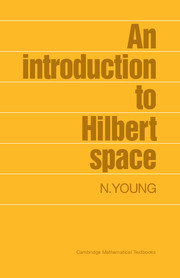Book contents
- Frontmatter
- Contents
- Foreword
- Introduction
- 1 Inner product spaces
- 2 Normed spaces
- 3 Hilbert and Banach spaces
- 4 Orthogonal expansions
- 5 Classical Fourier series
- 6 Dual spaces
- 7 Linear operators
- 8 Compact operators
- 9 Sturm–Liouville systems
- 10 Green's functions
- 11 Eigenfunction expansions
- 12 Positive operators and contractions
- 13 Hardy spaces
- 14 Interlude: complex analysis and operators in engineering
- 15 Approximation by analytic functions
- 16 Approximation by meromorphic functions
- Appendix: square roots of positive operators
- References
- Answers to selected problems
- Afterword
- Index of notation
- Subject index
14 - Interlude: complex analysis and operators in engineering
Published online by Cambridge University Press: 05 June 2012
- Frontmatter
- Contents
- Foreword
- Introduction
- 1 Inner product spaces
- 2 Normed spaces
- 3 Hilbert and Banach spaces
- 4 Orthogonal expansions
- 5 Classical Fourier series
- 6 Dual spaces
- 7 Linear operators
- 8 Compact operators
- 9 Sturm–Liouville systems
- 10 Green's functions
- 11 Eigenfunction expansions
- 12 Positive operators and contractions
- 13 Hardy spaces
- 14 Interlude: complex analysis and operators in engineering
- 15 Approximation by analytic functions
- 16 Approximation by meromorphic functions
- Appendix: square roots of positive operators
- References
- Answers to selected problems
- Afterword
- Index of notation
- Subject index
Summary
Let us pause a while from the technicalities of spaces and operators and reflect on the place of functional analysis in the wider picture. On the strength of remarks earlier in the book about the genesis of the subject we should certainly expect that functional analysis would provide a framework in which to formulate, discuss and (sometimes) solve problems in the description of phenomena on the basis of classical physics. The hanging chain example of Chapters 9–11 is intended to illustrate this aspect. But this is far from being the only role of the subject. It often happens that concepts introduced and developed for one purpose subsequently provide the key to understanding a quite different set of problems. Basic Hilbert space theory is at once close enough to our geometric intuition to be readily assimilated and advanced enough to provide powerful tools for deepening our knowledge over a wide area of mathematics. It is routinely used in differential geometry, complex analysis, number theory – indeed, almost every branch. As we learn more mathematics we come to appreciate better the inter-relationship between its parts, but in view of the brevity of life no individual can fully grasp all the ways in which a particular intellectual current flows through the body of mathematics and on into science. We can still gain some understanding of the process by studying particular instances, as we form conceptions of the natural and social orders from the relatively few places, things and people we know.
Information
- Type
- Chapter
- Information
- An Introduction to Hilbert Space , pp. 177 - 186Publisher: Cambridge University PressPrint publication year: 1988
